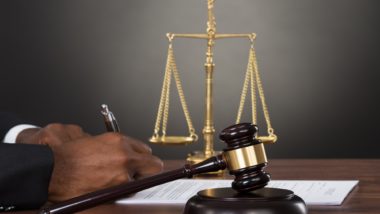Top Class Actions’s website and social media posts use affiliate links. If you make a purchase using such links, we may receive a commission, but it will not result in any additional charges to you. Please review our Affiliate Link Disclosure for more information.
Cybersecurity is a topic that already looms large in this age of ever-increasing digitization. And the threat of cyber attacks is even more relevant now than ever with rising tensions between NATO members and Russia amid the latter’s invasion of Ukraine.
Rory Innes, CEO of The Cyber Helpline, told Top Class Actions that governments, national infrastructures like utilities, banking and finance, and pharmaceuticals are common targets for cyber attacks.
“Cybersecurity is boring right up until the point it gets very exciting because something has gone wrong. The best thing people can do is bite the bullet and work to secure what they have before they have an issue,” Innes said.
Innes says that organizations can be targeted for various reasons such as online vulnerability, revenge, perceived injustices, geopolitical alignment, and ethics. It’s the same for individuals, and those with a high profile and money are likely to be targeted for financial gain.
“The continuous rise of digital currency (Bitcoin and others) coupled with the mostly anonymous nature of making a serious amount of money, is attracting many to commit ransomware attacks…almost every industry is ‘fair game,’” Amar Singh, CEO of Cyber Management Alliance, explained to Top Class Actions.
The current geopolitical situation will affect and increase cyberattacks
“There is no doubt that there has been an increase in the number of attempts to attack,” Singh told Top Class Actions. “There are numerous stories of successful attacks that are purely motivated by the current conflict.”
The increasing and almost complete digitization of many sectors enable anyone to launch powerful and devastating cyber attacks.
“Heightened tensions and sanctions against Russia have almost always been followed by retaliatory cyberattacks,” Innes said. “Cyber plays a key part of the battleground between superpowers and in times of heightened tension cyber attacks are used to steal intelligence, further military objectives, spread fake information or disrupt economies.”
This means he said that there is a heightened threat for almost all industries in the current climate.
Innes says this is also true for individuals, and individuals with links to Russia and Ukraine are likely to be targeted along with journalists and politicians.
As the tools of cyber warfare filter down into the hands of cybercriminals, these techniques are also likely to be used to target the general public. This means more victims and a large impact on their mental health, online confidence and financial security.
How can people better protect themselves against cyberattacks?
Always ensure your laptop, phone, tablet, and watch — all of your digital devices at home and work — are fully updated.
Criminals are often successful because people either forget or simply can’t be bothered to update their software.
Also, make sure to protect your critical systems and sensitive data credentials.
“For additional peace of mind, enable 2 Factor Authentication,” Singh said. “Criminals absolutely hate 2FA as it severely lowers their chances of success.”
All businesses should require highly skilled staff who can navigate the highly complex world of cybersecurity and related compliance and regulatory requirements.
Lasty, according to Singh, every organization should admit that they can and will be attacked by cybercriminals. Consequently, they must be prepared to detect and respond to cyberattacks without impacting the business. The organization must focus on Cyber Incident Planning and Response strategies, including creating effective incident response plans.
According to Innes, to ensure cyber safety, start by listing what accounts and devices you have, take a look at the security settings and make sure the security features are turned on, have a strong password — unique for each account if possible — and ensure two-factor authentication is enabled on all accounts.
People should also be cautious with clicking on links and attachments and what they share in terms of important information like social security numbers or sensitive images. Most importantly, people should trust their gut. If something doesn’t feel right, it’s essential to stop and think it through.
“If something does go wrong — get expert help. Be it from the police or from an organization like The Cyber Helpline. Expert help will minimize the impact and reduce the likelihood of repeat victimization,” Innes told Top Class Actions.
[getsocial app=”sharing_bar”]
Don’t Miss Out!
Check out our list of Class Action Lawsuits and Class Action Settlements you may qualify to join!
Read About More Class Action Lawsuits & Class Action Settlements:
ATTORNEY ADVERTISING
Top Class Actions is a Proud Member of the American Bar Association
LEGAL INFORMATION IS NOT LEGAL ADVICE
Top Class Actions Legal Statement
©2008 – 2024 Top Class Actions® LLC
Various Trademarks held by their respective owners
This website is not intended for viewing or usage by European Union citizens.















2 thoughts onHow consumers can protect themselves from cyberattacks
It seems like weekly I’m having to redo everything change accounts please add
Please add me